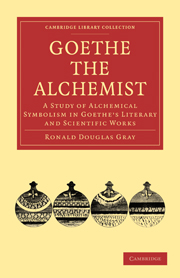XI - Conclusion
Published online by Cambridge University Press: 10 November 2010
Summary
The last quarter of the eighteenth century saw the renaissance of mystical and quasi-mystical beliefs of all shades. Spinoza, Plotinus, Plato, Boehme, Swedenborg and Cagliostro jostled one another for popularity, and the interest evoked by the least reputable of these cannot be divorced from that aroused by the true philosophers. Occultism was rife in many intellectual circles, and there was a certain sympathy for it even among the most serious thinkers of the age. In a movement which tended towards the irrational, the occultists represented the lunatic fringe. In this stream of metaphysical speculation belief in alchemy was, however, relatively unimportant: it was one means among many of satisfying spiritual needs. Nevertheless, the fact that it could attract so strongly the greatest genius of the era, the most insistent apostle of restraint and reason, demands some evaluation both of alchemy itself and of Goethe's attitude towards it.
Alchemy, as Goethe came to know it, was professed mainly by Christian teachers: it was one branch of that mystical Pietism represented by Boehme, Gottfrid Arnold and Susanna von Klettenberg. There was nothing contradictory in this association with Christianity. The fundamental ethical idea of the alchemists, that the way to a higher life lay through the strait gate, is fundamental also to the Christian religion. But it is not an exclusively Christian belief.
- Type
- Chapter
- Information
- Goethe the AlchemistA Study of Alchemical Symbolism in Goethe’s Literary and Scientific Works, pp. 250 - 262Publisher: Cambridge University PressPrint publication year: 2010First published in: 1952



